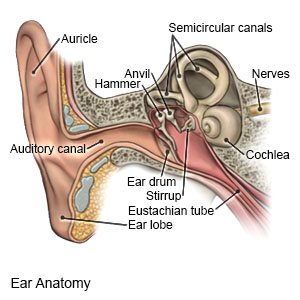Mastoiditis in Children
Medically reviewed by Drugs.com. Last updated on Aug 4, 2025.
What is mastoiditis?
Mastoiditis is an infection in the mastoid bone of your child's skull. The mastoid bone is located behind your child's ear. Mastoiditis is most common in children younger than 2 years who have a history of ear infections. Mastoiditis is often caused by an ear infection that spreads. Your child's ear canal swells and traps fluid inside his or her ear. Trapped fluid causes bacteria to grow and spread to the mastoid bone.
 |
What are the signs and symptoms of mastoiditis?
- Pain, redness, swelling, or tenderness behind or inside your child's ear
- Thick drainage from your child's ear
- An ear that sticks out from your child's head
- Headache
- Fever
- Fatigue or fussiness
- Vomiting or loss of appetite (small children)
- Hearing loss
How is mastoiditis diagnosed?
Your child's healthcare provider will examine your child's ear, and ask about your child's signs and symptoms. The provider may feel the outside of your child's ear for pain or swelling. The provider may also check your child's hearing. Your child may need any of the following:
- Blood tests may show infection or give information about your child's overall health.
- A fluid culture is a test of the fluid that drains from your child's ear. Fluid cultures may show the kind of bacteria causing the infection. Your child's healthcare provider may have to insert a small needle with a tube attached into your child's ear to get a fluid sample.
- X-ray, CT, or MRI pictures may show swelling and infection of the mastoid bone. It may also show if your child has bone damage or an abscess in his or her skull or brain. Your child may be given contrast liquid to help the skull, brain, and ear structures show up better in the pictures. Tell the healthcare provider if your child has ever had an allergic reaction to contrast liquid. Do not let your child enter the MRI room with anything metal. Metal can cause serious injury. Tell the healthcare provider if your child has any metal in or on his or her body.
How is mastoiditis treated?
Your child may need to spend a few days in the hospital for treatment and monitoring by a healthcare provider with training in ear diseases. Your child may also need any of the following:
- Medicine may be given to treat an infection or decrease pain and fever. Medicine may be given as an IV, eardrops, or pills.
- Ear drainage may be done to remove fluid from your child's ear. Your child's healthcare provider will insert a small needle with a tube attached to it. The provider will remove fluid through the tube. This may relieve pressure and pain. It may also improve your child's hearing.
- Surgery may be needed if other treatments do not work. Surgery may include placing tubes in your child's ear to help drain pus and fluid. It may also include removing part of the infected mastoid bone.
How can I help prevent ear infections that may lead to mastoiditis?
- Keep your child away from cigarette smoke, or areas that smell like cigarette smoke.
- Get early treatment for ear infections.
- Continue to breastfeed your child if you already are. This may reduce the risk of ear infections and mastoiditis.
- Vaccines may help prevent ear infections and mastoiditis. Ask your child's healthcare provider which vaccines are right for your child.
What can I do to care for my child's ears?
Keep your child's ears dry. Have your child use earplugs as directed when he or she bathes or swims. Fluid in your child's ears may slow healing and cause discomfort.
Call your local emergency number (911 in the US) if:
- Your child has a seizure or loses consciousness.
- You cannot wake your child.
When should I seek immediate care?
- Your child's symptoms, such as pain, redness, swelling, ear drainage, or hearing loss get worse.
- Your child's fever gets worse, or does not go away with treatment.
- Your child has a headache that does not go away with treatment.
- Your child has weakness in his or her face.
- Your child has a mass behind his or her ear that is red and swollen.
- Your child has a headache, fever, and a stiff neck.
When should I call my child's doctor?
- You think your child's medicine is not working.
- You have questions or concerns about your child's condition or care.
Care Agreement
You have the right to help plan your child's care. Learn about your child's health condition and how it may be treated. Discuss treatment options with your child's healthcare providers to decide what care you want for your child. The above information is an educational aid only. It is not intended as medical advice for individual conditions or treatments. Talk to your doctor, nurse or pharmacist before following any medical regimen to see if it is safe and effective for you.© Copyright Merative 2025 Information is for End User's use only and may not be sold, redistributed or otherwise used for commercial purposes.
Learn more about Mastoiditis
Treatment options
Care guides
Further information
Always consult your healthcare provider to ensure the information displayed on this page applies to your personal circumstances.
